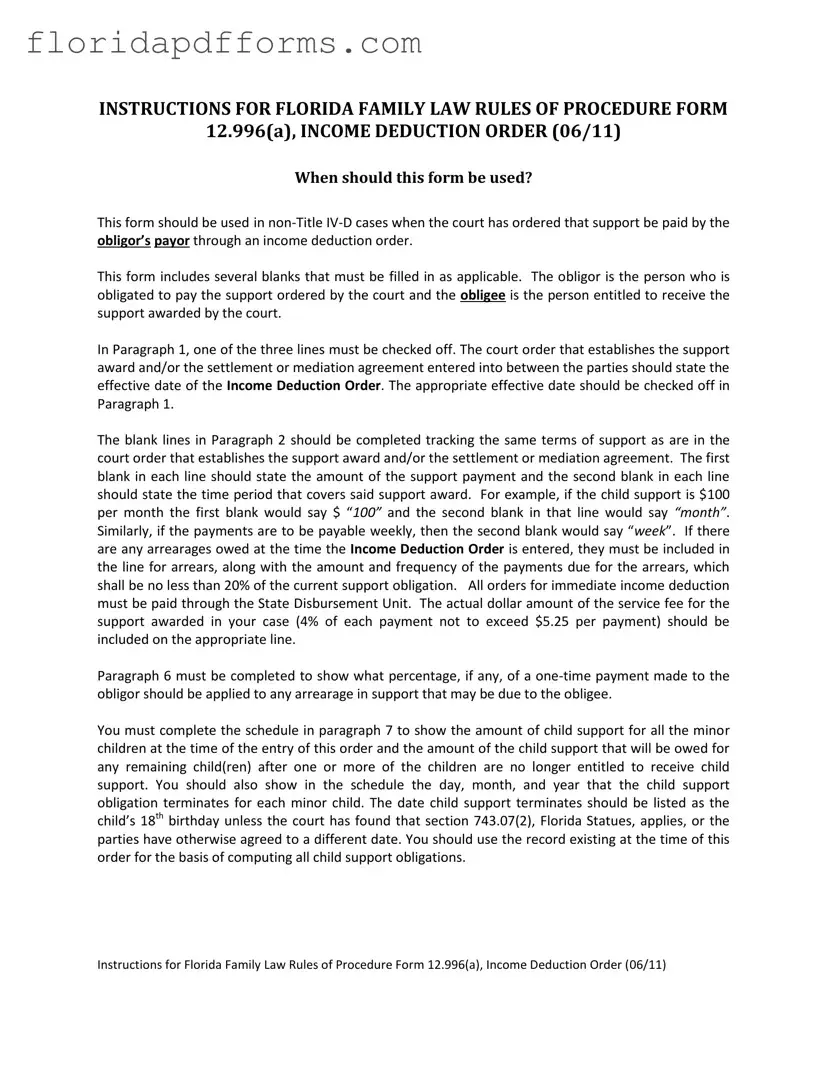INSTRUCTIONS FOR FLORIDA FAMILY LAW RULES OF PROCEDURE FORM
12.996(a), INCOME DEDUCTION ORDER (06/11)
When should this form be used?
This form should be used in non-Title IV-D cases when the court has ordered that support be paid by the
oligor’s payor through an income deduction order.
This form includes several blanks that must be filled in as applicable. The obligor is the person who is obligated to pay the support ordered by the court and the obligee is the person entitled to receive the support awarded by the court.
In Paragraph 1, one of the three lines must be checked off. The court order that establishes the support award and/or the settlement or mediation agreement entered into between the parties should state the effective date of the Income Deduction Order. The appropriate effective date should be checked off in Paragraph 1.
The blank lines in Paragraph 2 should be completed tracking the same terms of support as are in the court order that establishes the support award and/or the settlement or mediation agreement. The first blank in each line should state the amount of the support payment and the second blank in each line should state the time period that covers said support award. For example, if the child support is $100
per month the first blank would say $ |
100 and the second blank |
in that line would say |
o th . |
~i |
ila l ,#if#the#pa |
e ts#a e#to# e#pa a |
le#weekl ,#the #the#se o d# |
la k#would#sa # week |
.##Of#the e# |
are any arrearages owed at the time the Income Deduction Order is entered, they must be included in the line for arrears, along with the amount and frequency of the payments due for the arrears, which shall be no less than 20% of the current support obligation. All orders for immediate income deduction must be paid through the State Disbursement Unit. The actual dollar amount of the service fee for the support awarded in your case (4% of each payment not to exceed $5.25 per payment) should be included on the appropriate line.
Paragraph 6 must be completed to show what percentage, if any, of a one-time payment made to the obligor should be applied to any arrearage in support that may be due to the obligee.
You must complete the schedule in paragraph 7 to show the amount of child support for all the minor children at the time of the entry of this order and the amount of the child support that will be owed for any remaining child(ren) after one or more of the children are no longer entitled to receive child support. You should also show in the schedule the day, month, and year that the child support
obligation terminates for each minor child. The date child support terminates should be listed as the hild’s# 18th birthday unless the court has found that section 743.07(2), Florida Statues, applies, or the
parties have otherwise agreed to a different date. You should use the record existing at the time of this order for the basis of computing all child support obligations.
Instructions for Florida Family Law Rules of Procedure Form 12.996(a), Income Deduction Order (06/11)
What should I do next?
For this order to be effective, it must be signed by the judge. This form should be typed or printed in black ink. After completing this form, you must first send a copy to the other party or his or her attorney, if he or she is represented by an attorney, for approval or objection to the form before you send it to the judge assigned to your case. If the opposing party or his or her attorney, if represented, approves the form order, you may send the original proposed order and two copies to the judge assigned to your case with a letter telling the judge that you have first sent a copy of this proposed order to the opposing counsel or party, if unrepresented, and that they have no objection to the judge signing this order. If the other party or his or her attorney, if represented, has an objection to the proposed order as completed by you, you must tell the judge that you have sent a copy of this proposed order to the opposing party or his or her counsel, if represented, and that they specifically object to the entry of the proposed form Income Deduction Order. You must also send stamped self-addressed envelopes to the judge addressed to you and the opposing party or his or her attorney, if represented. You should keep a copy for your own records. If the judge signs the Income Deduction Order, the judge will mail you and the opposing party (or their attorney) copies of the signed order in the envelopes you provide to the court.
Where can I look for more information?
1efore#pro eedi g,#you#should#read# Ge eral#O for atio #for#~elf-zeprese ted#^itiga ts #fou d#at#the# beginning of these forms. The words that are in bold underline in these instructions are defined there. For further information see section 61.1301, Florida Statutes.
Special Instructions...
When the Income Deduction Order becomes effective (either immediately or delayed until arrearage), you must then also send a copy of the Income Deduction Order to the o ligo ’s#e plo e #alo g#with#a#
Notice to Payor, Florida Family Law Rules of Procedure Form 12.996(b), for the Income Deduction Order to take effect.
It is your responsibility to determine what extra steps and/or forms, if any, must be taken, supplied, and/or filed to insure the Income Deduction Order is implemented.
Remember, a person who is NOT an attorney is called a nonlawyer. If a nonlawyer helps you fill out these forms, that person must give you a copy of a Disclosure from Nonlawyer, Florida Family Law Rules of Procedure Form 12.900(a), before he or she helps you. A nonlawyer helping you fill out these forms also must put his or her name, address, and telephone number on the bottom of the last page of every form he or she helps you complete.
Instructions for Florida Family Law Rules of Procedure Form 12.996(a), Income Deduction Order (06/11)
IN THE CIRCUIT COURT OF THE _____________________ JUDICIAL CIRCUIT,
IN AND FOR ______________________________ COUNTY, FLORIDA
Case No: ________________________
Division: ________________________
_________________________________,
|
Petitioner, |
|
and |
_________________________________, |
|
Respondent. |
|
INCOME DEDUCTION ORDER (Non-Title IV-D Case) |
TO: |
ANY PRESENT OR SUBSEQUENT EMPLOYERS/PAYORS OF OBLIGOR |
|
{name} ________________________________________________________ |
YOU ARE HEREBY ORDERED to make regular deductions from all income due and payable to the above-named obligor in accordance with the terms of this order as follows:
1.This Income Deduction Order shall be effective [Choose only one]
|
|
immediately. |
|
|
|
|
|
|
|
|
|
|
|
|
|
|
|
|
|
|
|
|
|
|
|
|
|
|
upon a delinquency in the amount of $___________ ut# |
ot#to#e |
eed#o e# |
o th’s#pa |
e t,# |
|
|
|
|
pursuant to the order establishing, enforcing, or modifying the obligation. |
|
|
|
|
|
|
|
|
beginning {date} __________________. |
|
|
|
|
|
|
2. You shall deduct: |
|
|
|
|
|
|
|
|
|
|
|
$ |
|
per |
|
__ for child support. Child support shall be automatically reduced or terminated |
|
|
|
|
|
|
|
|
|
|
|
|
|
|
|
|
|
consistent with the schedule in paragraph 7. |
|
|
|
|
|
|
$ |
|
|
|
|
per |
|
for permanent alimony |
|
|
|
|
|
|
$ |
|
|
|
|
per |
|
for rehabilitative alimony |
|
|
|
|
$ |
|
|
|
|
per |
|
for |
|
|
arrears totaling $ |
|
|
|
|
|
|
|
|
|
|
|
|
|
|
|
|
|
|
The deduction for arrears shall be no less than 20% of the current support obligation. After the full amount of any arrears is paid, you shall deduct for attorneys’#fees and costs owed until the full amount is paid.
$ |
|
per |
|
for attorneys’#fees and costs totaling $ |
|
|
$ |
|
per |
|
for State of Florida Disbursement Unit fee |
|
|
|
|
(4% of each payment not to exceed $5.25 per payment) |
$ |
|
Total amount of income to be deducted each pay period |
Florida Family Law Rules of Procedure Form 12.996(a), Income Deduction Order (06/11)

3.コou#shall#pa #the#dedu ted#a ou t#to#the# ~tate#of#Flo ida#8is u se e t#ィ it ,#a d# ail#it#to#the#
State of Florida Disbursement Unit P.O. Box 8500, Tallahassee, FL 32314-8500, (tel.) (877) 769-0251.
All payments must include the o |
ligo ’s# |
a |
e# last,# |
iddle,#fi st ,#o ligo ’s#so |
ial#se u it # u e , |
o ligee’s# |
a |
e# last,# |
iddle, first), name of county where court order originated, and case number. |
$ll#pa e |
ts# |
ust# e# |
ade# |
# |
he k,# |
o |
e #o de ,# |
ashie ’s# he k,# e tified# |
he k,#o #th ough#the# |
Internet with access provided by the State of Florida www.floridasdu.com. No credit will be given for any payments made directly to the obligee without a court order permitting direct payments.
4.If a delinquency accrues after the order establishing, modifying, or enforcing the obligation has been entered and there is no order for repayment of the delinquency or a preexisting arrearage, a payor
shall deduct an additional 20 percent of the current support obligation or other amount agreed to by the parties until the delinquency and any attorneys’#fees and costs are paid in full. No deduction may be applied to attorneys’#fees and costs until the delinquency is paid in full.
5.You shall not deduct in excess of the amounts allowed under the Consumer Credit Protection Act, 15 U.S.C. 1673(b), as amended.
6. You shall deduct ( Choose only one) ( ) the full amount, ( ) _____%, or ( ) none of the income
which is payable to the obligor in the form of a bonus or other similar one-time payment, up to the amount of arrearage reported in the Income Deduction Order or the remaining balance thereof, and forward the payment to the State of Florida Disbursement Unit. For purposes of this subparagraph,
ous #means a payment in addition to an obligor's usual compensation and which is in addition to any amounts contracted for or otherwise legally due and shall not include any commission payments due an obligor.
7.Child Support Reduction/Termination Schedule. Child support shall be automatically reduced or terminated as set forth in the following schedule:
Please list |
|
Insert in this |
|
Insert in |
children |
|
column the |
|
this column |
by initials |
|
day, month, |
|
the amount |
from eldest to |
|
and year the |
|
of child |
youngest |
|
child support |
|
support for |
|
|
obligation |
|
all minor |
|
|
terminates for |
|
children |
|
|
each |
|
remaining |
|
|
designated |
|
(including |
|
|
child (see |
|
designated |
|
|
instructions) |
|
child). |
|
|
|
|
|
Child 1 (Eldest) Initials & year of birth:
From the effective date of this Income Deduction Order UNTIL the following
date:
child support for Child 1 and all other younger child(ren) should be paid in the following monthly amount:
Florida Family Law Rules of Procedure Form 12.996(a), Income Deduction Order (06/11)
Child 2 |
|
After the date set |
|
|
|
child support for Child 2 and |
|
|
|
|
|
|
|
|
Initials & year |
|
forth in the row |
|
|
|
all other younger child(ren) |
|
|
of birth: |
|
|
|
|
|
|
|
|
|
above until the |
|
|
|
should be paid in the |
|
|
|
|
following date: |
|
|
|
following monthly amount: |
|
|
|
|
|
|
|
|
|
|
|
|
|
|
|
|
|
|
|
|
|
|
|
|
|
|
|
|
Child 3 |
|
|
|
|
|
|
|
|
|
After the date set |
|
|
|
child support for Child 3 and |
|
|
Initials & year |
|
|
|
|
|
|
|
|
|
forth in the row |
|
|
|
all other younger child(ren) |
|
|
of birth: |
|
above until the |
|
|
|
should be paid in the |
|
|
|
|
|
|
|
|
|
|
|
|
|
following date: |
|
|
|
following monthly amount: |
|
|
|
|
|
|
|
|
|
|
|
|
|
|
|
|
|
Child 4 |
|
After the date set |
|
|
|
child support for Child 4 and |
|
|
Initials & year |
|
|
|
|
|
|
|
|
|
forth in the row |
|
|
|
all other younger child(ren) |
|
|
of birth: |
|
|
|
|
|
|
|
|
|
above until the |
|
|
|
should be paid in the |
|
|
|
|
following date: |
|
|
|
following monthly amount: |
|
|
|
|
|
|
|
|
Child 5 |
|
After the date set |
|
|
|
child support for Child 5 and |
|
|
|
|
|
|
|
|
Initials & year |
|
|
|
|
|
|
|
|
|
forth in the row |
|
|
|
all other younger child(ren) |
|
|
of birth: |
|
above until the |
|
|
|
should be paid in the |
|
|
|
|
|
|
|
|
|
|
|
|
|
following date: |
|
|
|
following monthly amount: |
|
|
|
|
|
|
|
|
|
|
|
|
|
|
|
|
|
|
|
|
|
|
|
|
|
|
|
|
|
(Continue on additional pages for additional children)
8.This Income Deduction Order shall remain in effect so long as the underlying order of support is effective or until further order of the court.
~、$、<d<e、#kF#k1^OGkz’~#zOGL、~,#z<d<8O<~,#$e8#8ィ、O<~
9.The obligor is required to pay all amounts and fees specified within this Income Deduction Order.
10.The amounts deducted may not be in excess of that allowed under the Consumer Credit Protection Act, 15 U.S.C. §1673(b) as amended.
11.This income deduction order applies to all of the o ligo ’s# u e t#a d#su se ue t#pa o s#a d# periods of employment.
12.A copy of the Income Deduction Order will be served upon the o ligo ’s#payor or payors.
13.Enforcement of the Income Deduction Order may only be contested on the ground of mistake of fact regarding the amount owed pursuant to the order establishing, enforcing, or modifying the obligation, the arrearages, or the identity of the obligor, the payor, or the obligee.
14.The obligor is required to notify the obligee and, when the obligee is receiving IV-D services, the IV-D agency, within 7 days of any changes in the obligo ’s#add ess,#payors, and the addresses of the
o ligo ’s#pa o s.#
Florida Family Law Rules of Procedure Form 12.996(a), Income Deduction Order (06/11)
15.In a Title IV-D case, if an obligation to pay current support is reduced or terminated due to emancipation of a child and the obligor owes an arrearage, retroactive support, delinquency, or costs, income deduction continues at the rate in effect immediately prior to emancipation until all arrearages, retroactive support, delinquencies, and costs are paid in full or until the amount of withholding is modified.
ORDERED on_____________________________.
____________________________________
CIRCUIT JUDGE
COPIES TO:
Obligee
Obligor
Other: ____________________________________
Florida Family Law Rules of Procedure Form 12.996(a), Income Deduction Order (06/11)




